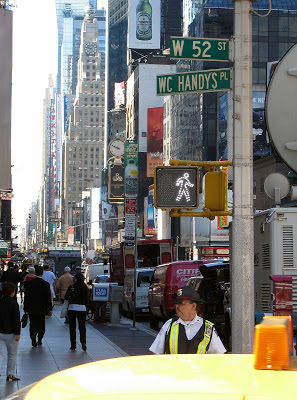Many Germans are obsessed with their broken history, whether right or left. In renaming streets and squares, they try to stun their feeling of guilt. Presently we watch a new wave of re-baptizing rolling in.
The other day, I read a note in the Berliner Zeitung that the citizens living on Treitschkestraße had a "plebiscite" against their street renaming. Heinrich von Treitschke, a renowned Prussian historian in the 19th century, wrote right-wing history books with sentences like the following about the annexed Alsace: These lands are ours due to the right of the sword, and we shall rule them because of the right of the German nation. We shall not allow those lost sons to grow apart from the Reich. We Germans know better what avails to the Alsatians ... we shall restitute their self against their own will. Even worse, Treitschke coined the later abused sentence: The Jews are our harm (Die Juden sind unser Unglück).
Going back in history: In 1945, with the fall of the Third Reich, all Nazi street names were eradicated. However, Freiburg's central axis Adolf-Hitler-Straße did not recover its previous name Kaiserstraße. To avoid any allusion to the Second Reich's Kaiser Wilhelm II, the street was renamed Kaiser-Joseph-Straße, reminiscent of the Habsburg rule of Joseph II, Maria-Theresa's son.
Similarly, when the Communist regime tumbled in the east in 1989, names like Walter-Ulbricht-Platz or Wilhelm-Pieck-Straße disappeared. Opposition arose when over-zeal city councils threw the baby out with the bathwater, re-baptizing streets named after Ernst Thälmann, the charismatic leader of Germany's Communist Party in the Weimar Republic, murdered by the Nazis.
The recent wave of changing names started in March 2012 when Münster's city council, Westphalia, renamed their Hindenburgplatz into Schlossplatz. This decision did not please everybody. A popular initiative against the decision evoked as a decisive argument the culture of remembrance (Erinnerungskultur): A square named 85 years ago after the First World War, General Paul von Hindenburg should keep its name. Mind you, since Hindenburg made Hitler Reichskanzler, he became a highly contested person. In September 2012, a citizens' vote eventually confirmed the city council's decision by 56,700 to 38,800 votes.
The street renaming mania reached Freiburg two months ago when the city's Commission of Cultural Affairs decided to scrutinize all 1300 street names. Yes, there is a Hindenburgstraße in Freiburg too. Still, concerning renaming streets, Freiburgers instead think of the so-called heros' quarter (Heldenviertel), where you find names of bloody First World War battles like Langemarck und Skagerrak (Battle of Jutland) together with the Imperial admiral Graf Spee and the fighter pilots Oswald Boelcke (Dicta Boelcke), Max Immelmann (Eagle of Lille), and Manfred von Richthofen (Red Baron). Besides, nationalist poets like Hermann Löns (Der Werwolf) and Gorch Fock (Seefahrt ist Not, i.e., Going to sea is necessary) have their street names.
Which street names will the commission propose to change, and where will they stop? Will they regard archbishop Conrad Gröber as an adversary of the Nazi regime, although initially, he sympathized with them? Is Alban-Stolz-Straße to be renamed because this catholic poet was an anti-Semite? And what about the namesake of an important Freiburg ring-street Karl von Rotteck, a great liberal personality but nevertheless accused of anti-Semitic quotations? I shall keep you informed.
.JPG) |
| ©Andreas Höfert |



This issue of street renaming is quite interesting, since I'm involved with local municipal issues like this. I've only had a couple of renamed roads in the past 12 years but one that had happened about 20 years ago still eats at me ...the road I live on is combined from 2 roads! Years ago it was the case to name a road by the direction or path that it took, so a road that traveled from Brooklyn to Evansville was named Evansville Road. Likewise the same road on the other end was named Brooklyn Road! So now the road had been renamed Evansville-Brooklyn Road, what a marriage, especially if you have to write it! I think it's interesting to follow the history of this street and road naming and in the case of the City of Green Bay they have changed a few street names based on favorite coaches of the Green Bay Packers (American football team)examples are Lombardi Ave., Holmgren Way and they were just about to change one street to the current coach, but I think that failed just last year. They still have the first coach immortalized in the naming of the stadium. Lambeau ("Curly") Field!
ReplyDelete